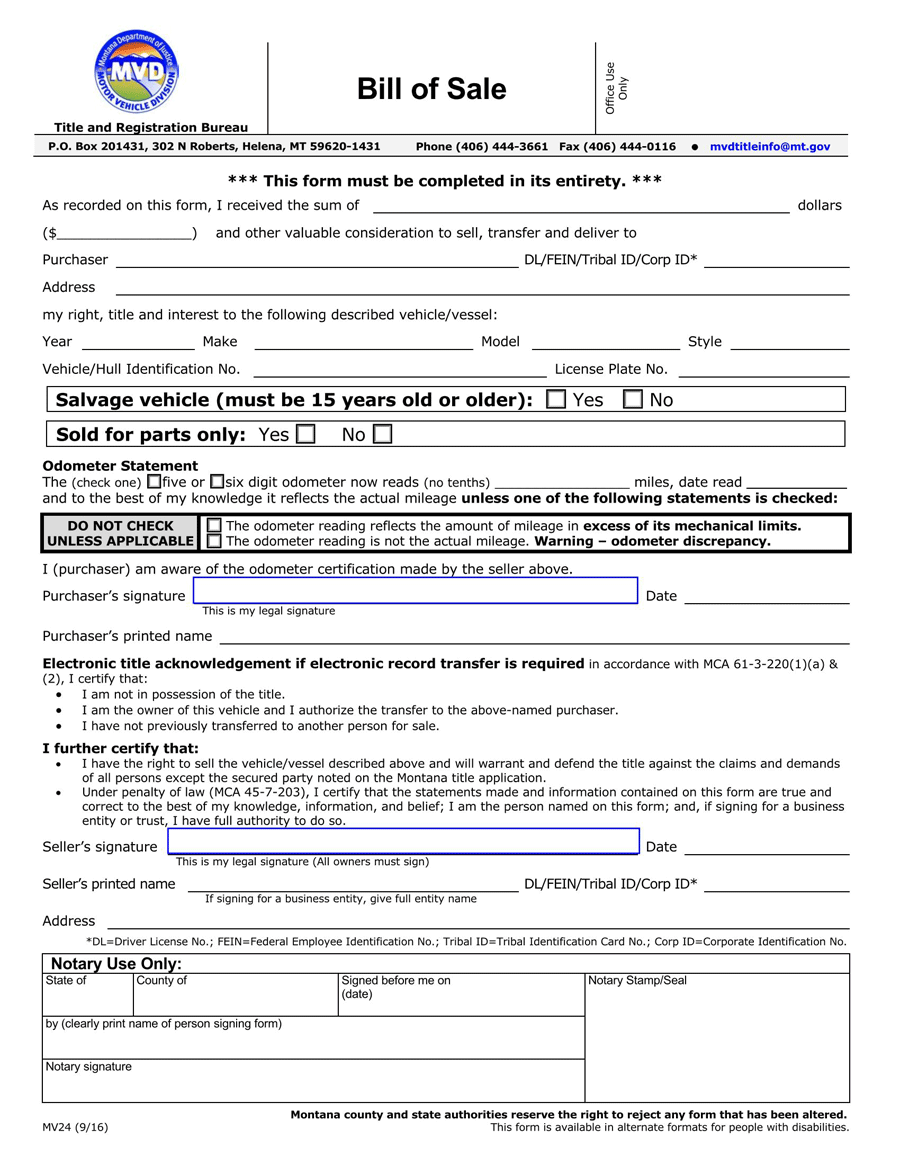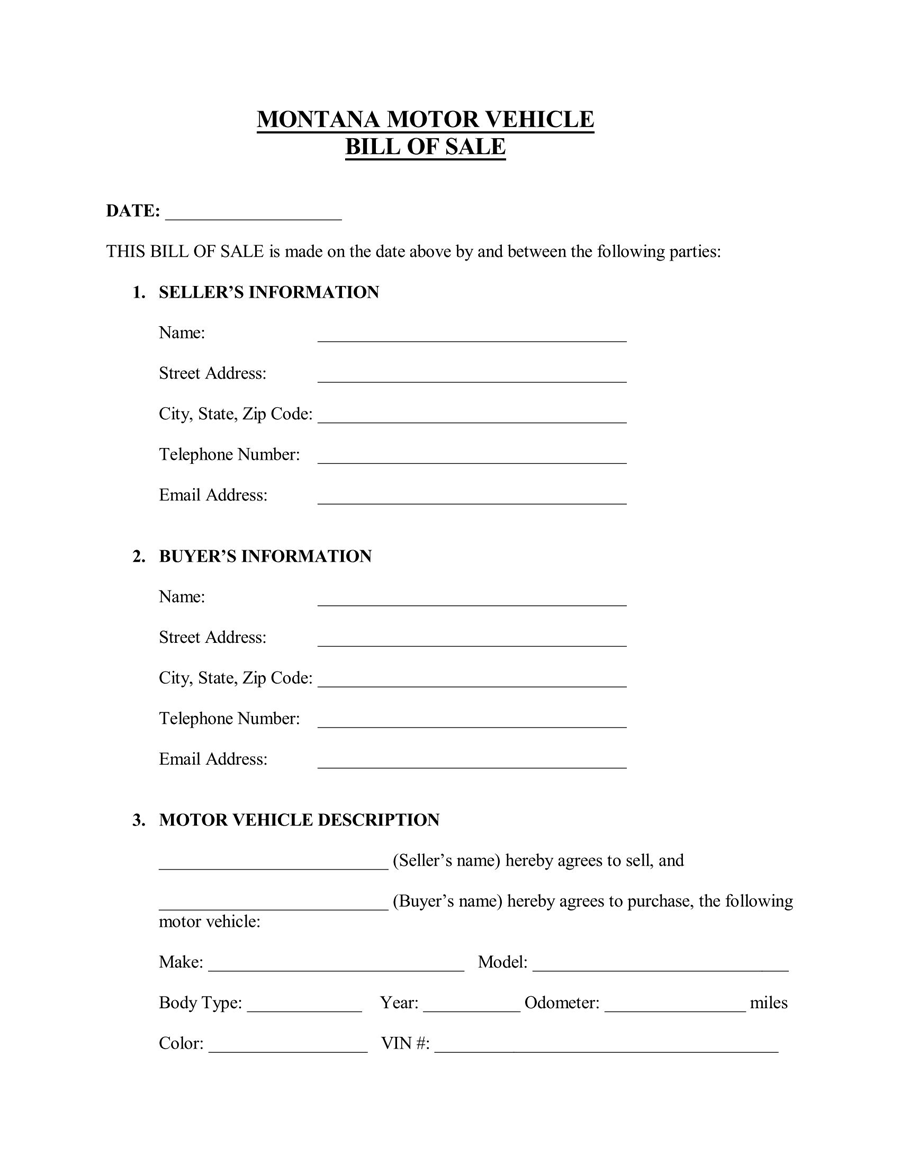When selling or purchasing a vehicle in the state of Montana, you will need a Montana bill of sale.
A Montana vehicle bill of sale acts as a legal document recording the sale and will be needed when registering the vehicle.
It can also be used as proof should there be any issues with the sale of the vehicle.
EXAMPLE
If there are any tickets against the vehicle, the Montana bill of sale can be used as proof of who owned the car at that time.
In order for a Montana vehicle bill of sale to be valid, it must be signed by both the seller and the buyer. In Montana, you don’t have to have the bill of sale notarized.
For a vehicle that is less than 16,000 lbs. or less than 10 years old, you will need to have Form MV90-A (Odometer Disclosure Statement).
If you are registering a motor vehicle for a third party, you will need to complete Form MV65-15 (Vehicle Power of Attorney).
Free Forms


Creating a Montana Vehicle Bill of Sale
For your convenience, you can download a Montana Bill of Sale from the Montana Department of Justice’s website. If you choose to create your own Montana vehicle bill of sale, you will need to make sure these key details are included:
- Legal names of both the seller and the buyer
- Contact details for both the seller and the buyer
- Date that the sale took place
- Amount that the vehicle was sold for
- Details about the vehicle, which include the make, model, year, VIN, odometer reading, style, and license plate number
- Signatures of both the seller and the buyer
- If required, notarization
Registering a Vehicle in Montana
As per Montana Code 61-3-311, the buyer has 60 days in which to have their vehicle registered. This is applicable to both Montana residents and those who have recently moved to the state of Montana. You can register your vehicle for either one or two years. Vehicles that are over 11 years are able to have permanent registration. All other vehicles will need to renew their registration every one to two years.
If you are moving to a different Montana county, you can use your current registration until it is time to renew.
Registration can be done face to face at your local County Treasurer’s Office, or through the Motor Vehicle Division, online service.
Titling and registering a vehicle is handled by the Montana Vehicle Services Bureau. This means you cannot title your vehicle without it being registered, both of which are done simultaneously. The only exception to this rule is pickup campers, which do not need to be registered.
Required Documents for Registering and Titling a Vehicle in Montana
When registering and titling a motor vehicle in the state of Montana, you will need to have the following documents:
- A current and valid Montana Driver’s License
- A completed Montana Bill of Sale (Form MV24), signed by both the buyer and the seller
- A completed Odometer Disclosure Statement (Form MV90-A)
- Form MV1-16 (Application for Certificate of Title). If the title has been lost or damaged, a replacement can be applied for at your local County Treasurer’s Office. This can be done using Form MV7
- Funds to cover Registration Fees
- Proof of insurance with a recognized Montana insurance provider. You will need to have the following minimum requirements:
- $20,000 of cover for destruction or injury of property (per accident)
- $25,000 of cover for death or bodily injury of an individual (per accident)
- $50,000 of cover for death or bodily injury of two or more individuals (per accident)
- If you are registering a vehicle for a third party, you will need to complete a Vehicle Power of Attorney.
Titling a Vehicle in Montana
You can apply for a vehicle title at your local County Treasurer’s Office. You will need to submit an out-of-state title or receipt for registration for the previous year. If a vehicle has been purchased from a dealership, the dealership will take care of the paperwork and send it to your county treasurer’s office.
In some instances, you may be required to clarify some facts about the purchase by completing Form MV100 (Statement of Fact). You will also need to cover fees for titling and for lien/security interest.
Once you have completed the titling process, your vehicle will be registered and you will be issued with license plates. If you have requested plates that are not available at the time of registration, you will be given a temporary permit for 40-days until the plates are made available.
By law, you must keep a copy of your registration receipt in your vehicle, as well as your proof of insurance, as stated in Montana Code 61-6-301.
Bonded Titles
As per Montana Code 61-3-208, if a title record cannot be found for a vehicle, you can apply for a bonded title with Form MV10 (Application for Bonded Title). On this form, you will need to include how you acquired the vehicle, the vehicle’s value, and whether there are any liens against the vehicle.
You will also need the following documents:
- Proof of vehicle ownership, such as a Montana bill of sale that has been notarized, canceled check, or an invoice of purchase.
- Form MV20 (VIN Inspection Certificate). This must be completed by a law enforcement officer.
Valuing a Vehicle
To value a motor vehicle, you will need to use the NADA (National Appraisal Guide), using the year that you are making the application. Vehicles that are over $500 will be given a bond via the insurance company that is equal to the vehicle’s value. Vehicles that are less than $500 will not require a bond.











